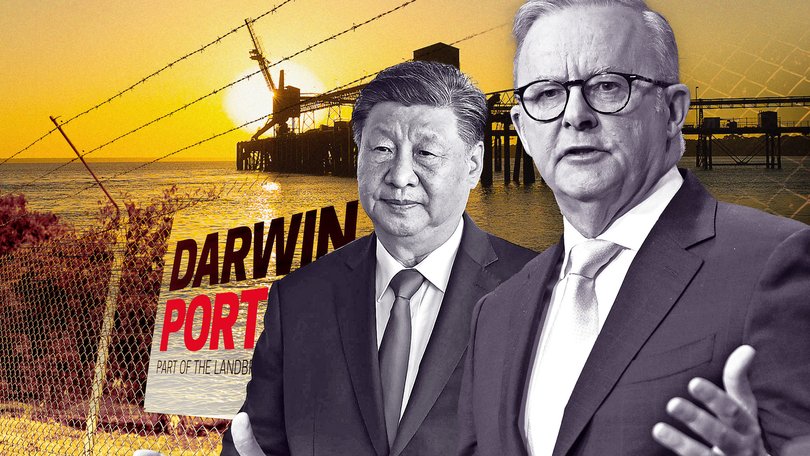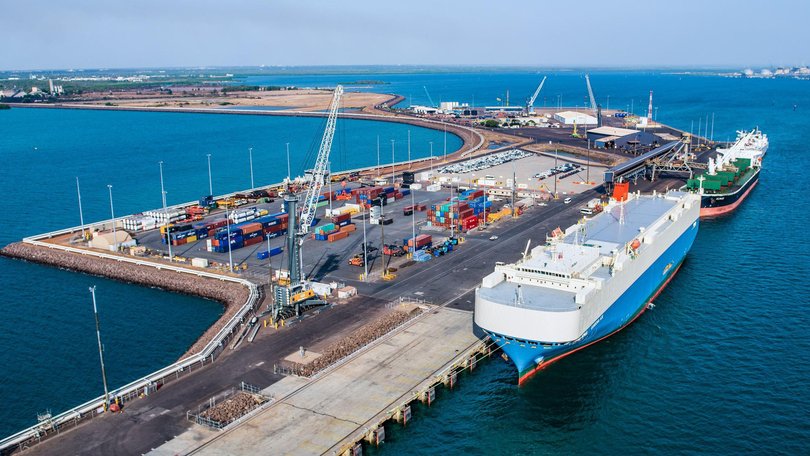Albanese urged to stand firm during China visit as Beijing scrutinises Darwin Port ownership, defence spend
Anthony Albanese is set to visit China amid a cloud of controversy over Chinese ownership and Australia’s defence spending.

The Prime Minister has been urged to “stand firm” on national security ahead of a trip to China where he is expected to face objections over defence spending hikes and Labor’s move to block Chinese ownership of the strategic Port of Darwin.
The South China Morning Post said that Anthony Albanese must discuss “more than the typical diplomatic niceties” in his meeting with Chinese President Xi Jinping in Beijing next week, warning that he would have “to explain his country’s stance on Chinese investment”.
The Hong Kong-based paper specifically highlighted the “the controversy over the ownership and potential government-influenced sale of the Darwin Port,” which Labor pledged during the Federal election campaign to return to Australia’s possession.
Sign up to The Nightly's newsletters.
Get the first look at the digital newspaper, curated daily stories and breaking headlines delivered to your inbox.
By continuing you agree to our Terms and Privacy Policy.The sale of Darwin Port to Beijing-controlled company Landbridge Group under a previous Coalition Government in 2015 was viewed by many, including Washington, as a strategic mistake.
Landbridge at the time was awarded a 99-year lease by the Northern Territory’s Country Liberal Party Government, but the Government is now looking for potential buyers.
“This will make for a difficult conversation,” reported the SCMP, referring to Beijing’s “high alert” approach to future divestments after the US pressured the Panamanian president to reduce Chinese influence over the Panama Canal or face retaliation.

Asked on Wednesday about Chinese sensitivities over the sale of the port, Treasurer Jim Chalmers told ABC Radio National Breakfast that there were “complexities” in the relationship with China.
“We don’t pretend that there aren’t, and this is one of them, and we’ll work through it with engagement, and we’ll work through it methodically in a considered way as we have with some of the other issues in the relationship,” he said.
The Treasurer said the port should never have been sold to a Chinese company and doubled down on the Government’s aim for it to “return to Australian hands,” declining to speculate on prospective buyers.
But he stressed the “important opportunity” of Mr Albanese’s trip to China.
“This is a trading relationship and economic relationship that benefits both sides, and we’ve shown a willingness and ability to stabilise that relationship, to engage in our national interests and in the interests of our workers and businesses and investors,” he said.
Reports of the Darwin issue being raised during the trip - in media strictly monitored by the Chinese government - follow high profile commentaries by Chinese ambassador to Australia Xiao Qian canvassing Beijing’s views in the run up to the visit.
Mr Xiao warned Canberra in the Australian to avoid a “heavy fiscal burden” by bowing to pressure to increase its military spending, and also indicated in the Australian Financial Review that Beijing would be open to expanding an existing free trade agreement to include artificial intelligence and the digital economy.
While the Government has confirmed the Prime Minister’s trip will have a strong economic and trade focus, it has also signalled it will not pursue the AI invitation and does not intend to relax foreign investment rules.
Mr Albanese will meet with both Premier Li Qiang and President Xi and attend the Australia-China CEO Roundtable, a platform for Australian and Chinese business leaders to strengthen trade and investment.
A number of senior business leaders will accompany him on what will be the Prime Minister’s second trip to China, and fourth meeting with Mr Xi.
In his first public comments about the visit on Tuesday, Mr Albanese said that “trade is now flowing freely” with Australia’s largest trading partner as the Government worked towards a “stable relationship”.
But he stressed that he would raise issues important to Australia and the region, and that Labor “will continue to cooperate with China where we can, disagree where we must, and engage in our national interest.”
Justin Bassi, executive director of the Australian Strategic Policy Institute (ASPI) urged Mr Albanese to avoid prioritising short term economic interests over longer term strategic necessities.
“Australia needs to stand firm on core interests such as protecting our national security, standing up for the rules-based order and the observance of human rights. If this upsets Beijing, then we manage the diplomatic fallout accordingly,” he told The Nightly.
Jennifer Parker, an expert associate at the ANU’s national security college, said the question of Australian defence spending and the trilateral AUKUS agreement between Australia, the US and UK would undoubtedly be raised in discussions.
She said Australia’s support for Washington’s strikes on Iran and the sale of Darwin Port could potentially be on the agenda.
On the port, Mr Albanese would likely argue in the same way as China does that he was acting in national interests, but he could be expected to push for an Australian rather than US acquisition to avoid embarrassment with Beijing, she said.
“I sense that . . . Albanese is going to be very keen to really step away from security discussions here and really just push on the economics,” said Ms Parker.
“I do wonder whether China might actually take that up as a theme, because on the economic standpoint, they can easily make an argument about what the US is doing to the global economy. Security might be a lesser conversation point on this trip.”
China’s foreign ministry on Tuesday indicated this would be the case.
Asked at the daily press briefing by the Beijing Youth Daily about expectations, spokeperson Mao Ning, said China-Australia relations had “continued to improve and grow.”
She added that China hoped through this visit the two sides would “strengthen communication, enhance mutual trust, expand practical cooperation, and further advance the comprehensive strategic partnership,” referring to a bilateral agreement forged in 2014.
The Global Times, a state media publication known to reflect the views of the government, said the trip reflected Australia’s effort to “shape a sense of certainty aligned with its national interests amid increasing global uncertainties to the international order and security”.
The two sides had potential for “more bilateral cooperation to spur regional free trade growth,” it said.
David, national president of the Australia China Business Council (ACBC), who will be participating in the trip as one of more than a dozen CEOs, told The Nightly the business community was “delighted” Mr Albanese was heading to China.
“From a business perspective and a national perspective. We know that Australia’s economic future really depends on how we turn up in the region,” he said.
“The world’s shifting right now, and we know that if we want to be competitive in the region, we’ve got to be proactive, we’ve got to be strategic, and we’ve got to be ready to lead.”
Mr Olsson said the ACBC was looking for progress on cooperation over climate change and the clean energy transition, better regulatory and market access for Australian exporters, and an improved environment for Chinese investors to Australia.
Despite geopolitical concerns, “there’s a strong case for saying that you can’t just put opportunity and risk at each end of a spectrum. Opportunity still exists. It’s just that the risks are slightly different to what they were a few years ago,” he said.
The world was also “very complex” for China, and there was a deeper realisation that the bilateral economic relationship was important to both nations, he said.
“They’re encouraging us to be ambitious about how we might think about the relationship. I don’t think they expect us to take everything, but they would like us to sit at the table and have a grown-up conversation about this.”

